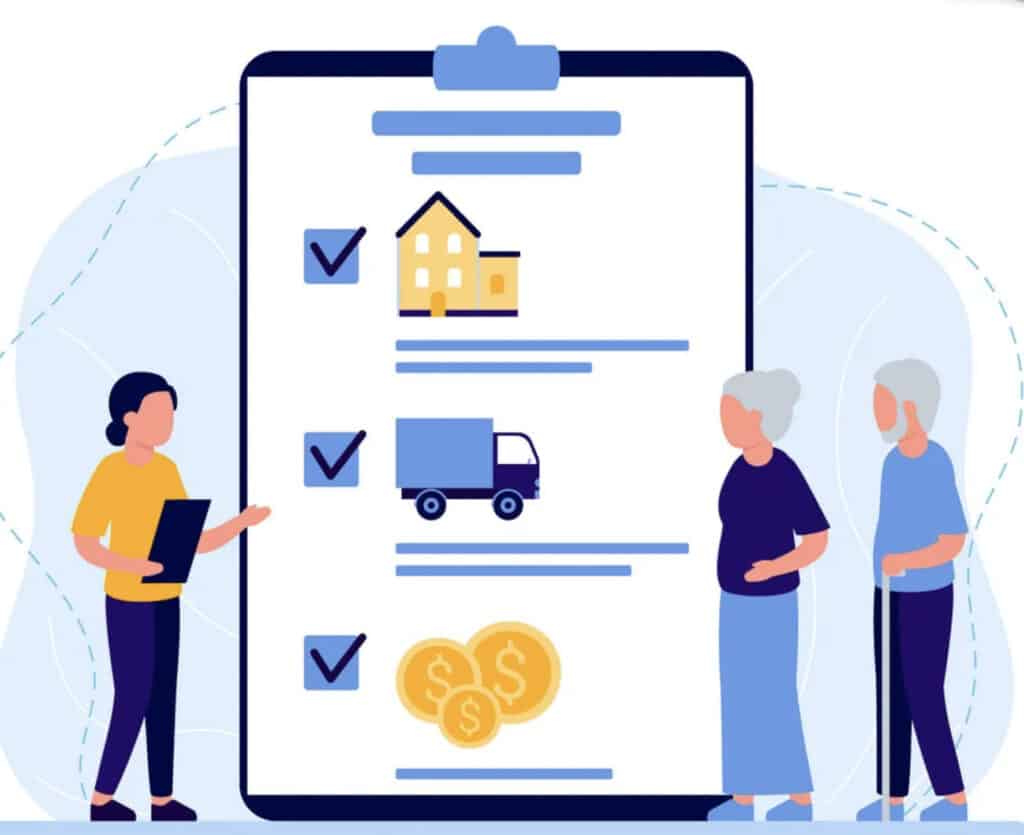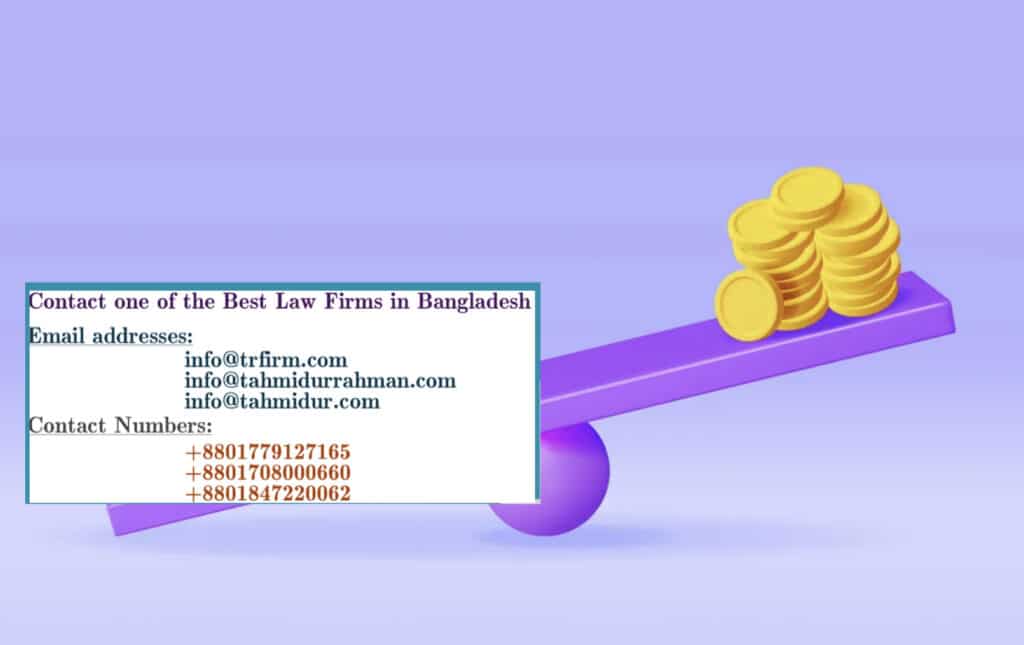A Complete Guide to Partition Suit in Bangladesh Between The Co-Sharers
Co-ownership of property is widespread in Bangladesh, which frequently results in disagreements amongst co-sharers over how to divide the assets. Co-owners have a legal avenue to demand a just and equitable allocation of jointly owned assets through partition lawsuits. This post from the legal team of Tahmidur Rahman Remura Wahid attempts to offer a thorough overview of partition suits in Bangladesh, covering the regulatory environment, steps, and important factors.
I. Partition Suit Legal Framework in Bangladesh:

The principal body of law guiding partition cases in Bangladesh is the Partition Act of 1893. The rights and remedies available to co-sharers wishing to divide jointly owned properties are described in this statute. In addition, the Code of Civil Procedure, 1908’s regulations have a big impact on how partition lawsuits are filed and decided.
II. Justifications for Bringing a Partition Case:
Co-sharers may bring a partition action for a number of reasons, such as:
- Desire for division: When a co-owner desires to achieve exclusive ownership by separating their portion from the jointly owned property.
- ownership dispute: A partition suit can be brought to settle a disagreement between co-sharers regarding ownership or usage of the property.
- Property sale: A partition suit can be started to split the property and make the sale possible when co-sharers want to sell the property but cannot agree on the terms.
III. The Partition Suit Filing Process:
- Writing and submitting the plaint:
The first stage in starting a partition lawsuit is writing the plaint, which must include crucial information such the names of all co-shareholders, a description of the property, and the relief sought. The competent court having jurisdiction is subsequently presented with the plaint. - The court’s assessment of the plaint:
After receiving the plaint, the court reviews its information and confirms that it complies with the law. If any flaws are found, the court may order the plaintiff to make them good. - Court issues summonses to all defendants after accepting the plaint, informing them of the partition litigation and the date of the first hearing.
- Pleadings and evidence:
In the next phases of the partition lawsuit, both parties must exchange pleadings and provide evidence. Each side has the chance to argue their position and back it up with pertinent evidence and witnesses. - Court evaluation:
The court assesses the merits of the partition lawsuit after reviewing the evidence and arguments put forth by the parties. A commissioner may be appointed by the court to survey the property and produce a report. - Decree and property division:
If the court is pleased with the evidence and determines that the partition suit is legitimate, it issues a decree for the property division. The court decides how much each co-sharer will receive, making ensuring that the allocation is fair and equitable. - Factors Taken into Account During Partition Proceedings:

To achieve a just and equitable split during the partition proceedings, the court considers a number of issues, including:
- Co-sharers’ shares: When calculating each co-sharer’s share in the partition, the court takes into account the scope of their individual ownership rights.
- Property’s current market value is a key aspect in calculating how much each co-sharer’s share is worth in terms of money.
- renovations made: The court may think about fairly compensating any co-sharer who made significant renovations or additions to the property.
- Co-sharers’ agreement: If there is a co-sharer agreement on the split of the property, the court may take that into consideration when making its decision. the order.
V. Appeals and Decree Enforcement
If any party disagrees with the court’s ruling, they have a certain amount of time to appeal it to a higher court. The co-sharers can move on with the property divide in accordance with the decree once it has become final and the court has the authority to enforce it.
Co-owners in Bangladesh who want to divide jointly owned property fairly have an effective legal remedy in partition actions. For people and organizations managing property conflicts, it is essential to understand the legal structure, processes, and important factors involved in partition suits. The law company “Tahmidur Rahman Remura Wahid” advises people to get expert legal counsel to make sure their rights are safeguarded and their interests are appropriately represented throughout partition processes.
Partition Act in Bangladesh
According to the legal provisions envisioned by Section 4 of the Partition Act, one of the distinguishing characteristics of a suit for partition is that it is between co-shares and relates to ejmalli property. A peaceful divorce is not a divorce in the eyes of the law.
A co-sharer who is in possession of more land than his share is obligated to part with it, but a co-sharer who is in possession of less land than his share is always allowed to ask for partition by filing a lawsuit in a court of competent jurisdiction. If his claim is supported by evidence, he is entitled to have the land divided.
Source/origin of the partition suit:

Someone makes the false assumption that the 1983 Partition Act is where and how the partition lawsuit originated. However, based on a plain reading of the 1983 Partition Act, we deduce that the Act only applies to the pre-emption of homestead lands in the event that any portion of it is sold to third parties, as well as to the partition of some impartibles by sale through courts. There is nothing else in this Act save these two points of view.
Because of this, even though some people incorrectly believe that the 1983 Partition Act is what gave rise to partition lawsuits, we are unable to prove this.
Furthermore, according to our research thus far, there is no particular statutory provision of law pertaining to the genesis and source of a partition claim. It is important to note that even though there isn’t a single, clear statute or codified law on partition of joint property, it is a very frequently used form of lawsuit in our nation.
The judges of the highest courts in this subcontinent have made significant contributions to this area of law in the absence of legislative legislation, and as a result, a solid, regular practice of law has been established.
The main source of the claims for partition is the dictums formed by the judicial decisions, which are founded on considerations of equity and convenience. Whatever the case, there are a few scattered statutory provisions, such as Section 54, Order 26 rr. 13 & 14 of CPC, Section 44 of the TPA, Article 144 of the Limitation Act, Sections 7 ViA and 7 iv (c) of the Court Fees Act, etc.
However, only a portion of the claims for partition are addressed by these statutes, entirely. In addition, legal rulings’ dicta serve as another important foundation for partition lawsuits.
But we can also point out that Section 143B of the State Acquisition and Tenancy Act states: "(1) Persons acquiring movable property through inheritance according to their separate personal laes must peacefully effect partition of the property among them following the death of the propositus. Following such a partition, a partition document must be registered under the Registration Act of 1908.
According to the provisions of this section, individuals who have acquired immovable property jointly through inheritance are entitled to an amicable division of that property; if one of the parties to that division objects, that right may be recognized by a civil court under Section 9 of the CPC, and that party may seek refuge in a civil court to obtain that right.
Therefore, our research suggests that this section 143B of the SAT Act should be regarded as the cause of the partition litigation under the existing laws of the land.
If anybody is wronged by such exclusive possession of a portion of joint land, they should seek redress through a partition litigation (12DLR708, 6BLD 155) in our favor.How is a property divided among co-owners?
Every divided property receives a new title, and each sharer renounces his or her mutual consent in favor of other sharers. Therefore, partition is a combination of giving up and transferring some estate rights, with the exception of easement-related rights.
After that, the transferee is free to do anything he wants with the property. As the sole owner of the property, he has the right to sell, trade, give, or transfer it. A partition deed is signed by the co-owners when a partition is agreed upon by both parties.
As with any other registration controlled by Section 17 of the Registration Act, 1908 in connection to an immovable property, the partition deed must be registered at the office of the sub-registrar of the location where the property is situated. It is also necessary to register a court order approving a compromise or settlement in which the parties’ shares are divided up according to metes and bounds.

The warishan certificate, also known as a legal heir certificate, is the second important document the heirs must gather. This document is necessary to establish the number of legal heirs and the percentage of the estate that will go to each legal heir. Such a document is crucial when it comes to property division, property mutation, declaratory actions, pension collection, etc.
Obtaining Succession certificate
The succession certificate is another crucial document required to confirm the legitimacy of the heirs and grant them the right to inherit any debts, securities, or other property that the deceased may have left behind. According to the Succession Act of 1925, such a certificate must be obtained from the Court of Joint District. The succession certificate can now be requested through the online court.
Registration fee for Partition deed in Bangladesh
If the market value of the property is between Tk 300,000 and Tk 500, the registration fee for a partition deed is Tk 500. The cost will be Tk 700 if the property is worth between Tk 300,000 and Tk 1,000,000. The charge is Tk 1,200 for amounts between Tk 1,000,000 and Tk 3,000,000, and Tk 1,800 for amounts between Tk 3,000,000 and Tk 5,000,000.
Despite the fact that each owner has an equal or partial ownership of the entire property, the physical boundaries of each owner’s portion are not clear.
There is no requirement that co-owners’ shares of a property be equal. Whether they invest in the property relies on the terms of the purchase agreement.
Shares of property owned by co-owners are transferable and inevitable. Each co-owner’s investment in the property should be expressly stated, as should their undivided part of the right, interest, and title to the property. By doing this, transfer, alienation, inheritance, and tax issues are reduced. The proper court must be contacted to launch a partition lawsuit.
Important things to note about Partition deed in Bangladesh
A partition deed should be written in clear, unambiguous language and executed on stamp paper. Each person’s portion must be expressed in a direct and explicit manner. A partition deed transfers ownership of property to new owners, and in order to be legally binding, it must be registered at the sub-registrar’s office.
The effective date of the partition should be specifically stated in the deed. The parties’ and their respective sharers’ names should be provided in detail. Additionally, the deed must be signed in front of two witnesses. The split of immovable property is invalid and void due to an unregistered partition deed.
On the basis of the registered partition deed, they can also request that changes be made to their respective shares in the MCD records.
It is probably preferable for co-owners to resolve any differences about how to use, divide, or sell a piece among themselves rather than squandering time and resources in court.
A mediator, who acts as a third-party impartial and assists the parties in their negotiations, may be able to find a more reasonable solution than a court and do it for a lot less money than protracted litigation. If someone wants to maintain good relations with a co-owner, for instance if that co-owner is a relative, mediation is a very useful tool.

The right to divide property is a “absolute right” that can only be curtailed by the law, a written waiver, or a clause in a will. Even if the right isn’t mentioned in a contract, it can still be exercised whenever you like. In order to keep the peace between the parties, courts typically favor partition as a remedy.
| Row | Topic | Description |
|---|---|---|
| 1 | Legal Framework | Discusses the legal framework governing partition suits in Bangladesh, including the Partition Act of 1893 and other relevant statutory provisions. Highlights the source and origin of partition suits and the role of judicial verdicts in establishing legal principles. |
| 2 | Grounds for Filing | Outlines the grounds on which a partition suit can be filed, such as disputes over possession, excess land, unequal distribution, or co-sharers’ convenience. Covers situations where co-sharers seek a fair division of jointly owned properties. |
| 3 | Procedure | Explains the step-by-step procedure for filing and pursuing a partition suit in Bangladesh. Covers drafting and filing the plaint, court’s examination of the plaint, issuance of summons to defendants, filing of pleadings and evidence, evaluation by the court, and the final decree. Includes information on division of property and enforcement of the decree. |
| 4 | Drafting and Filing the Plaint | Focuses on the process of drafting and filing the plaint in a partition suit. Explains the necessary details and documents required, such as identification of co-sharers, property description, and sought reliefs. Highlights the importance of engaging legal professionals for accuracy and effectiveness. |
| 5 | Court’s Examination of the Plaint | Highlights the court’s role in examining the plaint filed in a partition suit. Explains how the court reviews the plaint’s admissibility, jurisdiction, and compliance with legal requirements. Mentions the court’s power to make necessary amendments or clarifications if required. |
| 6 | Summons to Defendants | Focuses on the issuance of summons to defendants in a partition suit. Explains the process of serving summons to co-sharers and other interested parties, notifying them about the suit, and directing them to appear before the court. Mentions the consequences of non-appearance by the defendants. |
| 7 | Pleadings and Evidence | Discusses the stage of pleadings and evidence in a partition suit. Explains the filing of written statements, counterclaims, and the exchange of documents between the parties. Addresses the submission and examination of evidence, such as oral testimony, documents, and expert opinions. |
| 8 | Evaluation by the Court | Focuses on the court’s evaluation of the partition suit based on the presented evidence, arguments, and legal principles. Highlights the court’s role in determining the shares of the co-sharers, resolving disputes, and ensuring a fair and equitable division of the property. |
| 9 | Decree and Division of Property | Explains the issuance of the final decree by the court in a partition suit. Discusses the content and implications of the decree, including the division of the property among the co-sharers, determination of each party’s share, and any specific directions or restrictions mentioned. |
| 10 | Appeals and Enforcement of Decree | Addresses the right to appeal the court’s decision in a partition suit. Explains the procedure for filing an appeal before a higher court and the timeframe for doing so. Covers the enforcement of the final decree and subsequent actions required to implement the division of the property. |
Scope of Works of Tahmidur Rahman Remura in Property law in Bangladesh and Partition Suit:
i. Solution to Landlord/tenant disputes;
ii. Notices for defaults;
iii. Conduct legal proceedings;
iv. Drafting contracts;
v. Vetting of different types of land related contracts and documents;
vi. Legal advice on loan or mortgage documents;
vii. Filing petition for injunctions;
viii. Searching genuineness of land documents in the land offices;
ix. Any other task relating to land.
The Governing Laws and Ministry Relating to Real Estate and Property in Bangladesh
- The Land Survey Act 1875
- The Bengal Tenancy Act 1885
- The Transfer of Property Act 1882
- The Public Demands Recovery Act 1913
- The State Acquisition and Tenancy Act 1950
- The Land Development Tax Ordinance 1976
- The Land Reforms Ordinance 1984
- Immovable Property (Acquisition and Requisition) Act 2017 [previously, the Immovable Property (Acquisition and Requisition) Ordinance 1982]
- The Land Management Manual 1990.
Contact Tahmidur Rahman Remura Wahid for your partition suit in Bangladesh:
GLOBAL OFFICES:
DHAKA: House 410, ROAD 29, Mohakhali DOHS
DUBAI: Rolex Building, L-12 Sheikh Zayed Road
LONDON: 1156, St Giles Avenue, 330 High Holborn, London, WC1V 7QH
Email Addresses:
info@trfirm.com
info@tahmidur.com
info@tahmidurrahman.com
24/7 Contact Numbers, Even During Holidays:
+8801708000660
+8801847220062
+8801708080817
